 W
WA bulletin board system or BBS is a computer server running software that allows users to connect to the system using a terminal program. Once logged in, the user can perform functions such as uploading and downloading software and data, reading news and bulletins, and exchanging messages with other users through public message boards and sometimes via direct chatting. In the early 1980s, message networks such as FidoNet were developed to provide services such as NetMail, which is similar to internet-based email.
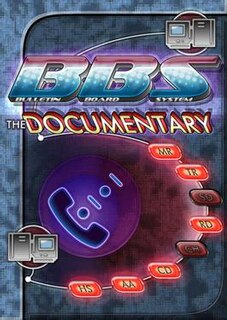 W
WBBS: The Documentary is a 3-disc, 8-episode documentary about the subculture born from the creation of the bulletin board system (BBS) filmed by computer historian Jason Scott of textfiles.com.
 W
WBlue Wave is a file-based offline mail reader that was popular among bulletin board system users, especially users of FidoNet and other networks that generated large volumes of mail. It allowed users to download all of their mail and messages, read and edit them offline, and then upload any replies. This reduced the amount of time they spent on line. The name "Blue Wave" originally referred to the client software, but as new clients were written that supported the same file format, the name came to refer primarily to the format itself.
 W
WBoardwatch Magazine, informally known as Boardwatch, was initially published and edited by Jack Rickard. Founded in 1987, it began as a publication for the online Bulletin Board Systems of the 1980s and 1990s and ultimately evolved into a trade magazine for the Internet service provider (ISP) industry in the late 1990s. The magazine was based in Lakewood, Colorado, and was published monthly.
 W
WThe Chebucto Community Net (CCN) is a Canadian FreeNet operating in Nova Scotia's Halifax Regional Municipality (HRM). It is registered as a non-profit society under Nova Scotia's Registry of Joint Stocks using the name Chebucto Community Net Society. The name "Chebucto" comes from the local l'nu word for Halifax Harbour meaning "big water".
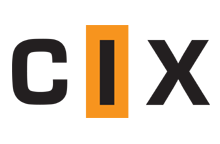 W
WCIX is an online based conferencing discussion system and was one of the earliest British Internet service providers. Founded in 1983 by Frank and Sylvia Thornley, it began as a FidoNet bulletin board system, but in 1987 was relaunched commercially as CIX. At the core of the service were many thousands of "conferences" - groups established by users to discuss particular topics, conceptually not unlike newsgroups but limited to CIX subscribers. These conferences still exist today although the CIX service has since expanded to include many other features. The service is funded by a monthly subscription charge rather than by advertising.
 W
WCommunity Memory (CM) was the first public computerized bulletin board system. Established in 1973 in Berkeley, California, it used an SDS 940 timesharing system in San Francisco connected via a 110 baud link to a teleprinter at a record store in Berkeley to let users enter and retrieve messages. Individuals could place messages in the computer and then look through the memory for a specific notice.
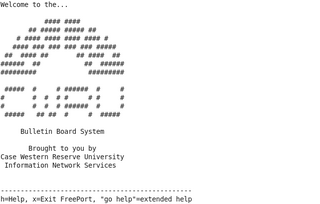 W
WA free-net was originally a computer system or network that provided public access to digital resources and community information, including personal communications, through modem dialup via the public switched telephone network. The concept originated in the health sciences to provide online help for medical patients. With the development of the Internet free-net systems became the first to offer limited Internet access to the general public to support the non-profit community work. The Cleveland Free-Net (cleveland.freenet.edu), founded in 1986, was the pioneering community network of this kind in the world.
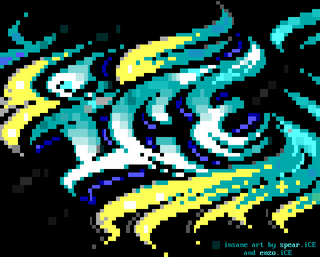 W
WiCE Advertisements is a digital art group founded in Canada by Many Axe in 1991. Although the expanded title is rarely ever used, iCE is an acronym for Insane Creators Enterprise. iCE, along with ACiD Productions, was one of the most prominent and critically successful groups on the underground computer artscene.
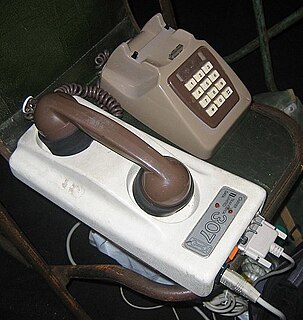 W
WA modulator-demodulator, or simply modem, is a computer hardware device that converts data from a digital format into a format suitable for an analog transmission medium such as telephone or radio. A modem transmits data by modulating one or more carrier wave signals to encode digital information, while the receiver demodulates the signal to recreate the original digital information. The goal is to produce a signal that can be transmitted easily and decoded reliably. Modems can be used with almost any means of transmitting analog signals, from light-emitting diodes to radio.
 W
Wmop.com is the name of a Chinese bulletin board system (BBS). Though popular in China, it has been cited as a source of controversy.
 W
WPicospan was a popular computer conferencing tool written by Marcus D. Watts for the Altos 68000. It was written in 1983, for the most famous and popular computer conferencing system at that time, called M-Net, which was owned and operated by Mike Myers. Sometime in 1984, Marcus's employer, an Ann Arbor company called Network Technologies International (NETI) purchased the rights for PicoSpan planning to develop it into a commercial product called E-Forum.
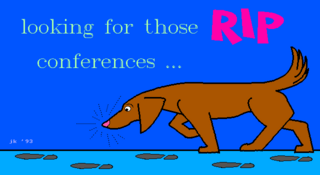 W
WThe Remote Imaging Protocol and its associated Remote Imaging Protocol Script language, RIPscrip, is a graphics language that provides a system for sending vector graphics over low-bandwidth links, notably modems. It was originally created by Jeff Reeder, Jim Bergman, and Mark Hayton of TeleGrafix Communications in Huntington Beach, California to enhance bulletin board systems and other applications.
 W
WRusty n Edie's BBS (Rusty-N-Edie's) was a bulletin board system founded on May 11, 1987 by the two SysOps, Russell & Edwina Hardenburgh, of Boardman, Ohio. At one point the BBS had over 14,000 subscribers across the United States, Canada, and Europe and over 124 modem lines.
 W
WSoulz at Zero (SAZ) was a lit group formed in 1994 by Jack Flack and The Stranger. SAZ released 25 monthly packs over a period of two years, beginning in September 1994 and ending in September 1996. The group took its name from a Souls at Zero poster Flack had in his bedroom at the time, with the trailing "s" in "Souls" changed to a "z". Soulz at Zero was so well known that their name was added to the "Elite Acronym List," which was used to separate "lamers" from "elite users."
 W
WA terminal emulator, terminal application, or term, is a computer program that emulates a video terminal within some other display architecture. Though typically synonymous with a shell or text terminal, the term terminal covers all remote terminals, including graphical interfaces. A terminal emulator inside a graphical user interface is often called a terminal window.
 W
Wtextfiles.com is a website dedicated to preserving the digital documents that contain the history of the bulletin board system (BBS) world and various subcultures, and thus providing "a glimpse into the history of writers and artists bound by the 128 characters that the American Standard Code for Information Interchange (ASCII) allowed them". The site categorizes and stores thousands of text files, primarily from the 1980s, but also contains some older files and some that were created well into the 1990s. A broad range of topics is presented, including anarchy, art, carding, computers, drugs, ezines, freemasonry, games, hacking, phreaking, politics, piracy, sex and UFOs. The site was created and is run by Jason Scott.
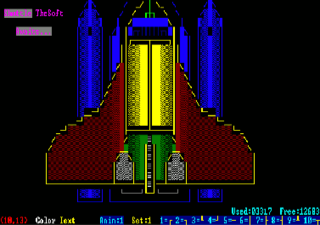 W
WTheDraw is a text editor for MS-DOS to create ANSI and animations as well as ASCII art. The editor is especially useful to create or modify files in ANSI format and text documents, which use the graphical characters of the IBM ASCII code pages, because they are not supported by Microsoft Windows anymore. The first version of the editor was developed in 1986 by Ian E. Davis of TheSoft Programming Services. The last public version of the editor was version 4.63, which was released in October 1993.
 W
WThe Whole Earth 'Lectronic Link, normally shortened to The WELL, is one of the oldest virtual communities in continuous operation. As of June 2012, it had 2,693 members. It is best known for its Internet forums, but also provides email, shell accounts, and web pages. The discussion and topics on The WELL range from deeply serious to trivial, depending on the nature and interests of the participants.
 W
WThe Z-Netz was a German BBS network applying store and forward mechanisms to provide their users with e-mail and discussion groups. It can be compared to the U.S. based WWIV network or the international FidoNet.